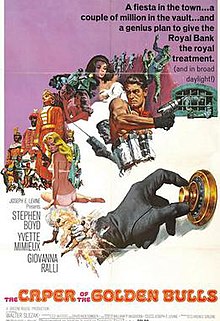
Pamplona, historically also known as Pampeluna in English, is the capital city of the Chartered Community of Navarre, in Spain.
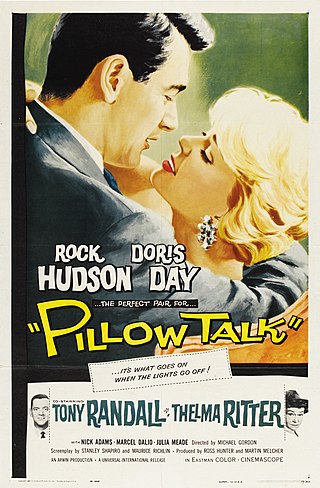
Pillow Talk is a 1959 American romantic comedy film in CinemaScope directed by Michael Gordon and starring Rock Hudson and Doris Day. The supporting cast features Tony Randall, Thelma Ritter, Nick Adams, Allen Jenkins, Marcel Dalio and Lee Patrick. The film was written by Russell Rouse, Maurice Richlin, Stanley Shapiro, and Clarence Greene.

A running of the bulls is an event that involves running in front of a small group of bulls, typically six but sometimes ten or more, that have been let loose on sectioned-off streets in a town, usually as part of a summertime festival. Particular breeds of cattle may be favored, such as the toro bravo in Spain, also often used in post-run bullfighting, and Camargue cattle in Occitan France, which are not fought. Bulls are typically used in such events.
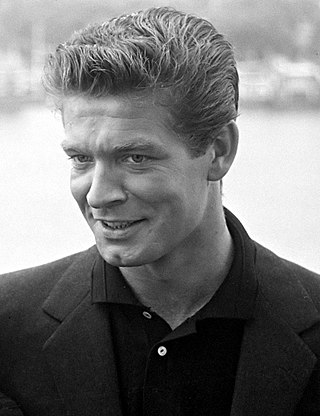
William Millar, better known by his stage name Stephen Boyd, was an actor from Northern Ireland. He emerged as a leading man during the late 1950s with his role as the villainous Messala in Ben-Hur (1959), a role that earned him the Golden Globe Award for Best Supporting Actor – Motion Picture. He received his second Golden Globe nomination for the musical Billy Rose's Jumbo (1962).

Yvette Carmen Mimieux was an American film and television actress who was a major star of the 1960s and 1970s. Her breakout role was in The Time Machine (1960). She was nominated for three Golden Globe Awards during her acting career.

Where the Boys Are is a 1960 American CinemaScope comedy film directed by Henry Levin and starring Connie Francis, Dolores Hart, Paula Prentiss, George Hamilton, Yvette Mimieux, Jim Hutton, and Frank Gorshin. It was written by George Wells based on the 1960 novel of the same name by Glendon Swarthout. The screenplay concerns four female college students who spend spring break in Fort Lauderdale. The title song "Where the Boys Are" was sung by Connie Francis, who played one of the foursome.
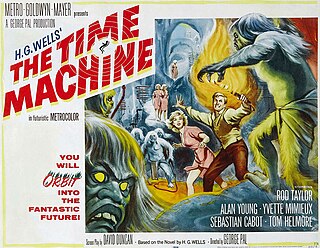
The Time Machine is a 1960 American period post-apocalyptic science fiction film based on the 1895 novella of the same name by H. G. Wells. It was produced and directed by George Pal, and stars Rod Taylor, Yvette Mimieux, and Alan Young. The story is set in Victorian England and follows an inventor who constructs a machine that enables him to travel into the distant future. Once there, he discovers that mankind's descendants have divided into two species, the passive, childlike, and vegetarian Eloi and the underground-dwelling Morlocks, who feed on the Eloi.

The Wonderful World of the Brothers Grimm is a 1962 American biographical fantasy film directed by Henry Levin and George Pal. The latter was the producer and also in charge of the stop motion animation. The film was one of the highest-grossing films of 1962. It won one Oscar and was nominated for three additional Academy Awards. The cast included several prominent actors—including Laurence Harvey, Karlheinz Böhm, Jim Backus, Barbara Eden and Buddy Hackett.
Chester Schaeffer was an American film and television editor with about thirty documentary and feature film credits, often for B movies.

We All Loved Each Other So Much is a 1974 Italian comedy-drama film directed by Ettore Scola, who co-wrote the screenplay with screenwriting duo Age & Scarpelli. It stars Nino Manfredi, Vittorio Gassman, Stefania Sandrelli, Stefano Satta Flores, Giovanna Ralli and Aldo Fabrizi. Widely considered one of the best films by Scola, and a notable example of the commedia all'italiana, it was dedicated to Italian director Vittorio De Sica. In 2008, the film was included on the Italian Ministry of Cultural Heritage's 100 Italian films to be saved, a list of 100 films that "have changed the collective memory of the country between 1942 and 1978."
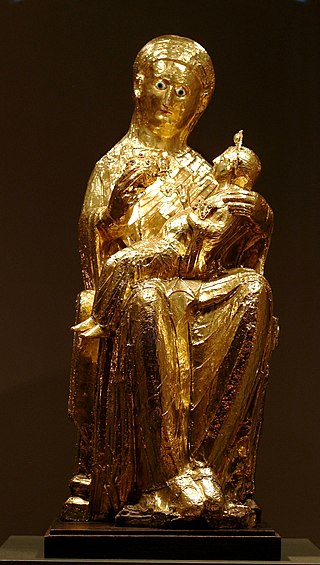
The Golden Madonna of Essen is a sculpture of the Virgin Mary and the infant Jesus. It is a wooden core covered with sheets of thin gold leaf. The piece is part of the treasury of Essen Cathedral, formerly the church of Essen Abbey, in North Rhine-Westphalia, Germany, and is kept on display at the cathedral.
Anthony Harvey was an English filmmaker who began his career as a teenage actor, was a film editor in the 1950s, and moved into directing in the mid-1960s. Harvey had fifteen film credits as an editor, and he directed thirteen films, the second of which, The Lion in Winter (1968), earned him a nomination for the Academy Award for Best Director. Harvey's career is also notable for his recurring work with a number of leading actors and directors including Terry-Thomas, Peter Sellers, Katharine Hepburn, Peter O'Toole, Richard Attenborough, Liv Ullmann, Sam Waterston, Nick Nolte, the Boulting Brothers, Anthony Asquith, Bryan Forbes and Stanley Kubrick. He died in November 2017 at the age of 87.

Giovanna Ralli,, is an Italian stage, film, and television actress.
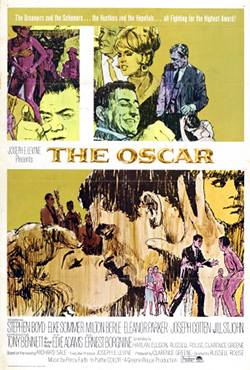
The Oscar is a 1966 American drama film directed by Russell Rouse and starring Stephen Boyd, Elke Sommer, Milton Berle, Eleanor Parker, Joseph Cotten, Jill St. John, Tony Bennett, Edie Adams and Ernest Borgnine.
Russell Rouse was an American screenwriter, director, and producer who is noted for the "offbeat creativity and originality" of his screenplays and for film noir movies and television episodes produced in the 1950s.

Dark of the Sun is a 1968 British adventure war film starring Rod Taylor, Yvette Mimieux, Jim Brown, and Peter Carsten. The film, which was directed by Jack Cardiff, is based on Wilbur Smith's 1965 novel, The Dark of the Sun. The story about a band of mercenaries sent on a dangerous mission during the Congo Crisis was adapted into a screenplay by Ranald MacDougall. Critics condemned the film on its original release for its graphic scenes of violence and torture.

That's the Way of the World is a 1975 film produced and directed by Sig Shore and starring Harvey Keitel. It features the music of R&B/Funk group Earth, Wind & Fire. The film depicts the music business and the life of record executives. A soundtrack by Earth, Wind & Fire released in the same year eventually became one of the group's landmark albums.

Dear Octopus is a comedy by the playwright and novelist Dodie Smith. It opened at the Queen's Theatre, London on 14 September 1938. On the outbreak of the Second World War in September 1939, the run was halted after 373 performances; after a spell in the provinces in early 1940, the play was brought back to London, and played two further runs there until 31 August 1940.
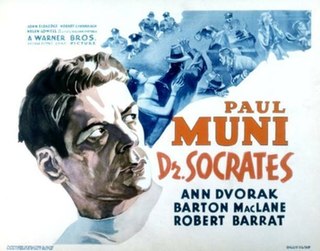
Dr. Socrates is a 1935 American crime film directed by William Dieterle and starring Paul Muni as a doctor forced to treat a wounded gangster, played by Barton MacLane.

The Virginia Women's Monument is a state memorial in Richmond, Virginia commemorating the contributions of Virginia women to the history of the Commonwealth of Virginia and the United States of America. Located on the grounds of the Virginia State Capitol, the monument is officially titled Voices from the Garden: The Virginia Women's Monument and features life-sized bronze statues of eleven Virginia women placed in a small granite plaza.
